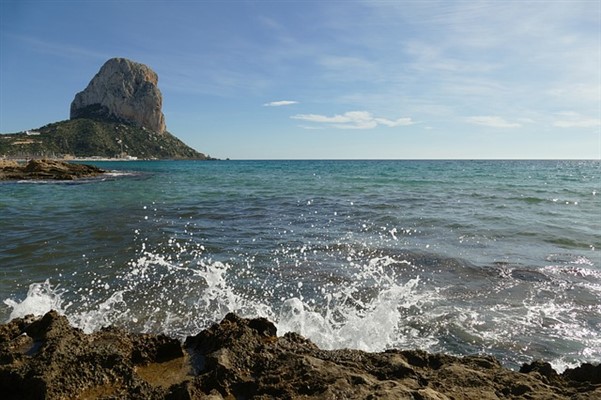A holiday in the north of the Costa Blanca is set in a greener and rougher landscape than the south, which is relatively flat and dry. The climate here is mild all year round with an annual average sunshine for 320 days, ideal for spending time on the numerous beaches on the Blue Flag along the coast.
Untouched Spanish ports and villages are still to be found in most of Spain. The Jalon Valley, a rural region of natural beauty and famous for its vineyards and wines is located inland from the seafront resort of Denia and Javea, most popular among holidaymakers. The vineyards lead to citrus groves further north. The northern hills of Costa White are mainly surrounded by pine trees that offer a distinctive Mediterranean fragrance alongside the citrus trees.
Benidorm has come a long way from its days as a bucket and spade resort, and is now much more upscale. It still has 2 beaches with soft sand, which is ideal for family vacations and the best nightlife in the Costa Blanca, but with its delightable Old Town and the Terra Mitica inspired park the resort has a lot more to offer.
The white-washed village of Altea is situated on the coast of the Sierra de Bernia to the north of Benidorm. Altea is largely untouched by mass tourism, and thus still retains its old Spanish feel. Altea is renowned for its blue dome, the church of the Virgin de Consuelo. The beach is about 6 km long and separated by cliffs into a smaller swimming pool. The beach is a long walk away. A rental holiday vacation rental in Altea provides a quieter location except for day trips near Benidorm.

The towering Penon de Ifach is dominated by Calpe, a vertically-sided rock overlooking the city from the Mediterranean. It is a former fishing town and now, with a charming Valencian and stunning sandy beaches, is one of Costa Blanca’s most famous northern resorts. There is a fishing port in the city where you can watch catches every day, even though a magnificent marina houses dream yachts next door.
From the ancient city walls next to the Moorish quarter, the city’s defense against pirate attacks, can be seen a vision of Calpes past. The Roman villa remains near Paseo Maritimo and more at the Archaeology Museum towns are to show the Roman heritage of the Calpes. Calpe’s self-catering provides many different styles of facilities from frontline Calpes Beach apartments to luxurious villas overlooking Calpe and the Ifach Penon.
Recommended article: Granada: A Popular Travel Destination
Between Calpe and Moraira lies the small village of Benissa, not to be missed by the Marina Alta Cathedral.
On the Mediterranean side is Moraira, a small town with hills rising up to the Jalon valley. Moraira has an average of 18 degrees of climate during the year and a significant average sunshine of 325 days is about one hour from the Alicante airport.
On the port side, the town retains the history of its fishery port and many fish caught on a plate are still seen in one of the excellent restaurants and bars around the new marina and port during the fascinating fish market from Tuesday to Sunday.
Moraira is 8km from the coast, several of the Blue Flag beaches. Many vacation rentals in Moraira are luxury villas with private swimming pools set in the hills overlooking this town.
Javea is located in a very beautiful location. This town has a colonial history and the old town with its traditional buildings with its narrow balconies overlooks Playa del Arenal’s main beach of Javea, and its long sandy stretch. The Avenida del Mediterraneo is situated by the port of Javea, alongside bars and restaurants. Many of the Javea lodgings on the site overlook the town of Javea and its beaches with a wonderful view from the hills.
Denia is much more a family destination, a quiet fishing town, which loads up and sells daily catches on the city market. The Denia climate, as is the third safest place to live, is mild but has a long sunshine and an average annual temperature of 19 degrees, as is most towns and cities in the area. The climate is optimal for the region’s oranges and lemon groves and an ideal climate for vacationers.
The Castle is home to Denia’s most significant history, which dates from Roman times and is open to the public. The golf resort of La Sella is situated inland from Denia, and many of our properties are well known for the golfer among you. With more than 20 km of shoreline to relax in, Denia is a holiday villa for a relaxing family.



